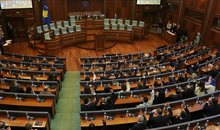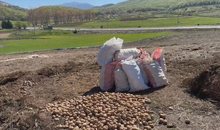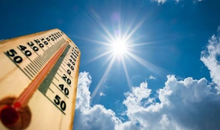
 Flash News
Flash News
Fight between teenagers, 15-year-old ends up in hospital
Kosovo Assembly constitution, proposal for secret ballot fails
Serious accident on the Peqin-Elbasan axis, two people seriously injured
'Fight, fight, fight'/ PD-ASHM towards historic victory, LaCivita mobilizes the campaign at the meeting with the candidates
Car hits pedestrian on Korça - Pogradec road, 43-year-old woman dies
Heat stress, Albanian workers most vulnerable in the Region to climate change

Climate hazards have a direct impact on people, reducing incomes and damaging productive assets. In the Western Balkans, rising temperatures and falling rainfall are starting to affect workers. Albania will be the hardest hit, the International Labor Organization (ILO) estimates.
Heat stress will significantly affect the Western Balkan countries, with Albania estimated to be the hardest hit in the Region in terms of labor productivity.
Climate change risk scenarios show that Albania is projected to lose 0.07 percent of working hours in 2030, equivalent to about 700 full-time jobs.
Heat stress increases the risk of workplace accidents, with deaths often occurring during the first few days on a new job.
High temperatures contribute to increased absenteeism from work due to heat-related illnesses, further reducing worker productivity.
The direct impact of natural disasters on workplaces in the Western Balkans was demonstrated during the 2014 floods.
Damage to economic and transport infrastructure led to the loss of jobs for 33,500 workers in Bosnia and Herzegovina, and the temporary loss of 51,800 jobs were temporarily damaged in Serbia.
The October 2024 floods in Bosnia and Herzegovina displaced 1,100 families, destroyed 800 homes, and severely impacted agriculture and small businesses.
The World Bank, analyzing these developments, noted that the negative impacts of natural hazards on labor productivity, income, and assets can push people into poverty. Losses due to extreme weather events fall primarily on poor households.
On the other hand, poor people have limited access to savings, credit and insurance to help them manage losses of income or assets. While current data on damage and losses in the region tend to focus on the impacts of disasters on public assets and infrastructure, losses due to extreme weather events fall primarily on poor households./ Monitor
Latest news


DP candidate: Patronage agents follow us in cars during electoral meetings
2025-05-01 22:40:28



Forza Italia MP: Only Sali Berisha as Prime Minister can lead Albania to Europe
2025-05-01 21:29:47

For those who were scared by Tomorr Alizoti
2025-05-01 21:05:21
Berisha challenges Rama: You promised free healthcare, come here and keep it!
2025-05-01 20:56:58



The six best foods against stomach bloating
2025-05-01 20:04:09


Zelensky: We want peace, Russia responds with attacks
2025-05-01 19:22:07

Berisha: The contract in the US is not just for the DP, but for every Albanian!
2025-05-01 19:08:14
Fight between teenagers, 15-year-old ends up in hospital
2025-05-01 18:44:17






Demi Moore named the most beautiful woman in the world for 2025
2025-05-01 17:34:10
Waltz to step down as Trump's national security adviser
2025-05-01 17:24:25

What has Albania exported the most?
2025-05-01 16:49:18
Accident at 9-story building in Tirana, two injured
2025-05-01 16:47:16
How is lifestyle affecting health? Expert: Addictions are causing malnutrition
2025-05-01 16:32:09
Kosovo Assembly constitution, proposal for secret ballot fails
2025-05-01 16:22:35

Britain in talks with France and Saudi Arabia on recognizing Palestinian state
2025-05-01 15:57:30

Russian drones strike major cities in Ukraine
2025-05-01 15:39:45
Farmers in difficulty, Egyptian potatoes outstrip Steblevë's
2025-05-01 15:31:36
Serious accident on the Peqin-Elbasan axis, two people seriously injured
2025-05-01 15:15:25
Inaugurated a few months ago, Zhupa: Handball stadium, dangerous for children
2025-05-01 15:10:19
Eurostat: Albanians are paid less, but have the longest working hours in Europe
2025-05-01 14:57:32
The most effective vitamins for strengthening the immune system
2025-05-01 14:53:06

May 1/ Workers in Kosovo protest for their rights, demand wage increases
2025-05-01 14:33:55

Roven Zeka met in the cell, SPAK investigates 4 police officers, phones seized
2025-05-01 14:17:09




Xhaferri: Pro-Rama polls are manipulated by incinerator payments
2025-05-01 13:23:16
51-year-old woman disappears in Kukës, search begins
2025-05-01 13:02:20

Fallen in England, 32-year-old woman dies after falling from parachute
2025-05-01 12:44:54





Staged explosion in Elbasan, head of family wanted asylum in the EU
2025-05-01 11:17:10
Muzhaqi: ChatGPT prepared a very beautiful speech for me
2025-05-01 11:11:29
Berat Prosecution seeks 6 years in prison for pedophile who molested a minor
2025-05-01 10:53:00

TNT explosion in Elbasan, police react: Cameras have filmed the perpetrator
2025-05-01 10:28:31
7x7 doesn't make 6 million for us, but 33 thousand euros!
2025-05-01 10:23:13

TNT explosion in an apartment in Elbasan
2025-05-01 10:03:01
Accident on the "Memaliaj-Krahës" axis, 71-year-old man loses his life
2025-05-01 09:44:45


Vehicle bombed in Tirana, explosives placed in front tire
2025-05-01 09:10:30

Car hits pedestrian on Korça - Pogradec road, 43-year-old woman dies
2025-05-01 08:39:39
Sunshine and temperatures up to 30 degrees Celsius, weather forecast
2025-05-01 08:21:48
Today is Workers' Day, what does May 1st represent?
2025-05-01 08:05:44
Posta e mëngjesit/ Me 2 rreshta: Çfarë pati rëndësi dje në Shqipëri
2025-05-01 07:55:45
Journalist: Rama used the money to lobby for himself, not for Albania
2025-04-30 22:54:10
Kurti's invitation to constitute the Assembly, PDK responds, LDK refuses
2025-04-30 22:36:18











Fiscal peace or electoral coup?! Businesses owe 1.6 billion euros to the state
2025-04-30 18:59:05


Finland passes law banning cell phones in schools
2025-04-30 18:00:25

Italian court overturns Hysaj's conviction, Albanian defender fined 40,000 euros
2025-04-30 17:32:13


Minerals deal with US could be signed within next 24 hours, Ukraine confirms
2025-04-30 16:53:19

Stress at the office can be more dangerous than smoking!
2025-04-30 16:18:54
